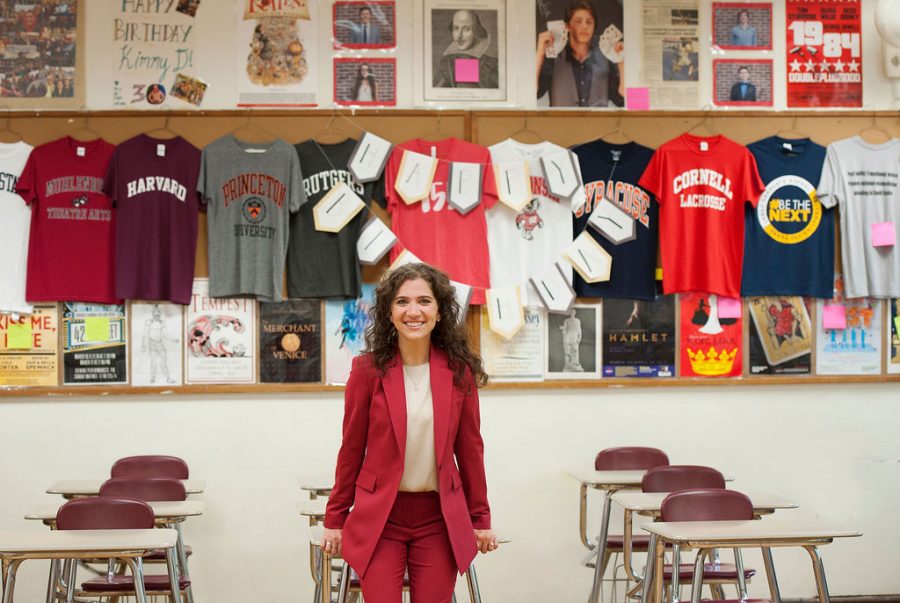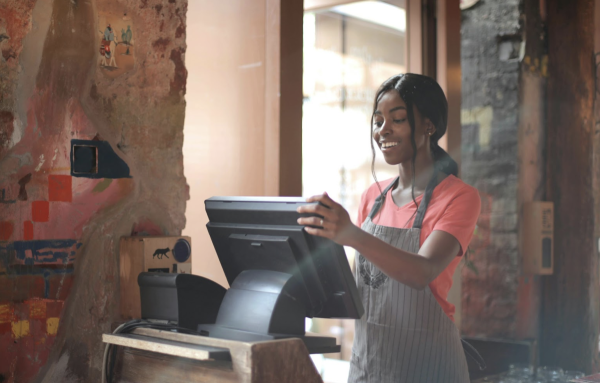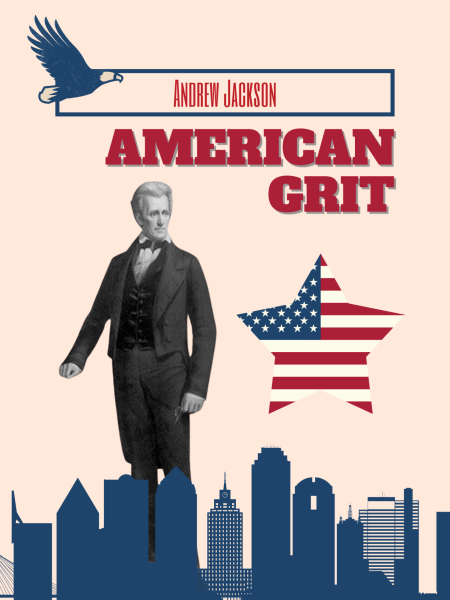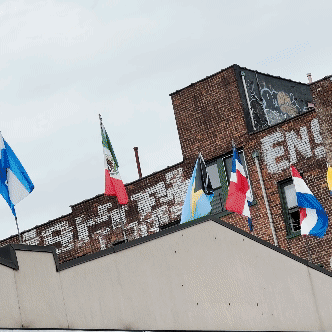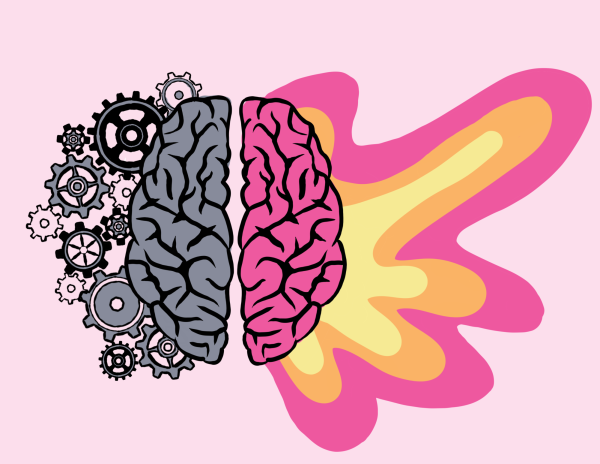Kim Dickstein stays true to her roots as an educator
The New Jersey Teacher of the Year teaches English at Haddonfield Memorial. She graduated from Eastern in 2004.
New Jersey State Teacher of the Year, Kim Dickstein, still carries the lessons she learned from Eastern.
After graduating Eastern in 2004, Ms. Dickstein attended Rutgers University, New Brunswick, studying English and Political Science. She later earned her masters degree in Education from Rutgers. She completed her student teaching at Haddonfield Memorial High School, where she teaches today.
Dickstein said that the teachers at Eastern created an “environment that enabled her to launch into her career and set her up for success.”
She remembered her poetry project on love in Ms. O’Keefe’s class, and reading “Lord of the Flies” with Mr. Bowne. The Gifted and Talented program with Mrs. Rabin and Mr. Fulton was a highlight.
As a class officer, she worked closely with Ms. Houghton, her class advisor. She recalled participating in debate with Mr. Kemery. She also mentioned the impact that Ms. Helig and Mr. Worthington had on her, and how she still lives by the words of wisdom, “don’t talk about it, be about it.”
“All of my teachers always empowered me to go above and beyond,” she said, “and achieve my goals, and exceed my own expectations.” There was not one person that made her who she is today. “You take a little bit of each person along the journey,” she said.
Her grammy was also a mentor. She has “always been a guiding light in my life,” she said. Grammy had five precepts that now guide her as an educator:
- “If at first you don’t succeed, try and try again.”
- “Listen to learn and learn to listen.”
- “The more you know the more you grow.”
- “Knowledge is power.”
- “Smile and the world smiles with you.”
How did she get into teaching? Dean Justine Hernandez Levine at Rutgers (now at Princeton) encouraged her. Dickstein said she always knew she wanted to be an educator, but was always encouraged to pursue a career in law. Her whole life she had been educating people in different ways, through teaching swimming lessons, teaching Hebrew school, tutoring, and volunteering as a ‘big sister.’
It wasn’t until she sat down with her dean, however, that she realized her true calling was education. “There’s nothing greater than really making an impact,” Dickstein said.
Attending Eastern completely changed her professional career and how she teaches today. She said that the clubs and activities she participated in taught her to be a leader. But it was Eastern’s Gifted and Talented program where she learned to be an educator.
“The gifted and talented program at Eastern totally shaped my way of thinking,” she said. “That program challenges students to be really metacognitive, and think about their own thinking. I learned how to think for myself and think independently. I was empowered to do a lot of community work and community projects through that program… having 4 years in that program was key.” She said she grew through her experiences in that program and learned educational philosophy through Bloom’s Taxonomy.
Ms. Janet Rabin was not surprised by Dickstien’s achievement. She taught G/T for nineteen years at Eastern.
“Kim was always a leader,” Rabin said. “She’s always been highly moral with a great degree of integrity.” — Janet Rabin
Rabin credited Dickstein’s supportive parents for the success of their daughter. The parents were delighted with the Gifted and Talented program because it allowed students a great deal of independence. “It allowed them to see what to do with themselves once they were in the real world.”
“All I did was to offer possibilities,” Rabin said, who retired in 2006, after teaching at Eastern for nineteen years. She now lives on the West Coast of Florida. She said she hopes Dickstein will continue to learn and grow with her studies, perhaps pursue a doctorate. She hopes the state will allow Dickstien to continue her role as an educational ambassador.
William Fulton, another Gifted and Talented teacher at the time, said, “Three components of a “gifted” student are high intelligence, creativity, and task commitment. While in high school, Kim continued to build in the first area, continually developed the second, and dominated the third.” Fulton recalled how she was spirited, energetic, and animated, as well as friendly, outgoing, and well-mannered.
He said, “She researched, studied and expanded the breadth of her knowledge by looking at topics from a variety of angles. Upon gaining knowledge she manipulated it in new ways – continuing to expand her understanding.” He presumed any of her other Eastern teachers would agree with him.
“Kim shined brightest with the Model United Nations,” Fulton said. It was in Model United Nations that Kim and her peers researched their topics and attempted to create solutions for real world problems. He said, “It was perfect for her mind, body, and spirit.”
Fulton said he is not surprised that Kim has excelled in education: “Her energy alone is contagious,” he said, “As a student, she did not just push the envelope, she ripped it open establishing new boundaries for others and inviting them to participate in fresh, exciting ways.” — William Fulton
One of Dickstein’s classmates, Alicia DiNatale, was fighting a battle with cancer. When she passed, Kim’s class began The Alicia Rose Victorious Foundation in honor of their classmate. The foundation was a philanthropic effort to supply children’s hospitals with more age appropriate things for teens, as Alicia had often complained that the children’s hospitals had no activities for teenagers. The foundation that began when Dickstein was in high school still continues to this day.
Before being named New Jersey State Teacher of the Year, Dickstein was recognized in many other ways. In June 2019, she was recognized as a Princeton University Distinguished Secondary School Teacher for “her work as an educator and advocate.” She was previously awarded with the Martin Luther King Jr. Freedom Medal 2019 for “selflessly contributing her time and effort to better her community.”
In November 2017, Dickstein was named a South Jersey SuperWoman by South Jersey Magazine.
Being named New Jersey State Teacher of the Year was a call to action; she says her call to action is to lift the voices of all stakeholders in education and to empower others. She said it is her goal to give back and create community.
Before the school closures, she was touring schools and organizations involved with education around the state of NJ, trying to amplify their voices by connecting them to networks and education stakeholders that could help provide more access.
When schools closed, due to COVID-19, she saw an opportunity gap; she explained that close to 10% of NJ students do not have internet access at home. To accommodate those students, a program called NJTV Learning Live was created. NJTV Learning Live is an on-air instruction series, which aims to help kids learn remotely. https://www.njtvonline.org/programs/njtv-learning-live/The program provides quality instruction to children (grades 3-6) by airing lessons, filmed by teachers, for public television. Ms. Dickstein hosts the program and features hour-long classes in various subject matters, taught by NJ teachers. NJTV Learning Live has reached 200 hours on air, which has helped students all over NJ, and as a result has empowered over 200 educators.
Ms. Dickstein teaches Shakespeare and Greek drama courses, and said that the arts are very near and dear to her heart. She explained that she often tries to incorporate the arts into her classroom, as the arts have always been a top priority of hers, specifically in Shakespearean Greek drama and theatre arts.
“Live theatre space has the ability to hold a mirror up to society and really challenge our understanding of our world,” she said.
The principal of Haddonfield Memorial High School, Tammy McHale, said it has been an honor working with Dickstien. “She values her students and incorporates ways to be global citizens in her instruction,” McHale said. “Kim has done amazing things as NJSTOY, but we are very excited to have her back come September.”
With technology dominating the 21st century, teachers have had to adapt their classrooms to the ever-changing world of technology. Dickstein said, over the years, she has actually relied less and less on technology.
Dickstein said we are craving the human experience and human connection as technology becomes something that we believe is the essential tool. “Focusing on social emotional wellness and human interaction has become more of my priority than technology has,” she said. “With technology, I have leaned on research and collaboration more, but not at the expense of human interaction.”
As for teaching in general, there are highs and lows. She explained the highlights of being an educator, as well as the most stressful and frustrating parts.
She said the human interaction that goes along with teaching, and the connections made with those in her classroom bring her joy. She said, her classes “start in September as strangers, and leave in June as family.” She said “The highlight for me is building community… a thoughtful educator values community.”
It is frustrating, she said, navigating the classroom against changes in testing expectations and changes in administration. The biggest problems teachers face, she said, are low teacher morale, the shifting perceptions of education, and job justice.
Job justice, or teachers being paid as professionals, is a problem that many teachers face. “I do not feel dismayed by the conversations around teacher pay and respect for the profession,” she said, “because I do think there’s always opportunity for improvement.
The COVID-19 closures have shifted an appreciation for educators and what they do.
She suggests “finding the good” and “praising it” are essential. Educators need to promote the good work happening in their classrooms and not to take it for granted. “We have to celebrate that and find community partners willing to do that with us,” she said. She hopes educators are always treated like the professionals.
And what is her greatest impact on the students at Haddonfield? This model: “anything is possible.”
Thinking for yourself is essential. She is proud that her students leave her classroom and have learned how to think for themselves. She instills in her students if they can dream it, it can happen; she said, “You fail. Fail big, fail miserably. Get back up and do it again.”
Would she encourage students to pursue teaching? “Teaching is an endurance sport,’ she said. “It requires intellectual athleticism… persistence is key. The opportunities in education are infinite. You just have to be willing to be open to them and seize those opportunities.”
She acknowledges that the classroom presents many challenges. However, “there’s no greater gift.” Think of the impact that an educator can make on a child’s life?
“I cannot think of a profession that is more noble,” she said. “I cannot think of another profession where you can single handedly, in a moment, change the course of someone’s life”

